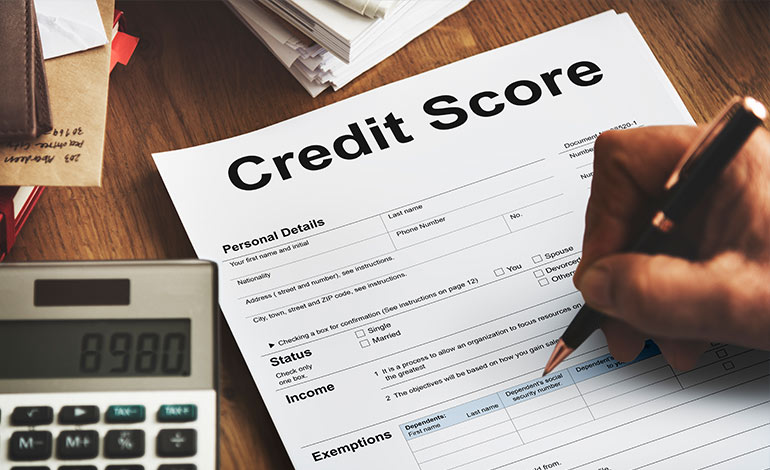When you’re getting ready to buy a home, it’s important to understand your credit score. Think of it as a measure of how well you handle money. It’s a big deal when you’re applying for a loan to buy a house. Your credit score can affect whether you get approved for a mortgage and what interest rate you’ll pay. Let’s talk about why your credit score matters, how it affects your chances of getting a loan, and some simple things you can do to make it better.
1. What constitutes a credit score and why does it hold significance?
Your credit score is a measure of how well you handle your finances. It tells lenders whether you’re likely to repay money you borrow. Scores typically range from 300 to 850, with higher numbers indicating lower risk for lenders.When lenders, like banks, consider giving you a mortgage (a big loan for buying a house), they want to ensure you’re a responsible borrower. Your credit score is like a financial fingerprint that shows lenders how good you are with money. It’s a number that sums up your money history, like if you pay bills on time, how much debt you have, and how long you’ve been using credit. Lenders use this number to decide if they should lend you money. When you want to get a mortgage to buy a house, your credit score is super important. It helps lenders figure out if they should give you a loan, what interest rate you’ll pay, and what kind of loan terms you’ll get. If you have a high credit score, you’ll probably get lower interest rates and better loan deals. But if your score is low, you might end up paying more in interest, or you could even get turned down for a loan.
2. How Your Credit Score Affects Your Loan Options:
Your credit score can have a big impact on what kinds of loans you can get. If your score is high, lenders see you as less risky, so you’ll have more options and might get better deals with lower interest rates. But if your score is low, it can be harder to get approved for a loan. You might have to pay higher interest rates, which means more money out of your pocket each month. In some cases, you might even need to put down a bigger down payment to qualify for a loan. So, having a good credit score opens up more doors and can save you money in the long run.
3. Impact of Your Credit Score on Home Loans
Now, let’s see how this number affects your home buying journey:
4. Interest Rate:
When you borrow money for a home loan, you have to pay back not only what you borrowed but also extra money called interest.Your credit score affects how much interest you have to pay. Think of it like this: if you have a high credit score, lenders trust you more, so they give you a better deal on interest rates.So, having a higher credit score means you get a lower interest rate. And that’s great news because it means you’ll end up paying less money overall. It’s like scoring a discount on the cost of borrowing money!
5. Loan Approval:
Before lenders give you a home loan, they want to make sure you’ll pay them back. Your credit score helps them decide.If your credit score is high, lenders trust you more. It’s like having a good track record that shows you’re responsible with money.But if your credit score is low, lenders might worry you won’t pay them back. They might say no to giving you a loan. It’s like asking to borrow something when someone knows you’re not reliable.
6. Down Payments:
When you buy a home, you typically need to make an upfront payment known as a down payment. It’s like making a big initial payment before you start paying off the rest of the house.Having a higher credit score can sometimes mean you need to put down less money upfront. Why? Because lenders see you as less risky. It’s like getting a head start on saving for something big because you’ve already proven you’re responsible with money.
Understanding how your credit score impacts these aspects of home loans can help you see why it’s important to build and maintain good credit. It’s not just a number; it’s a key that unlocks better opportunities when it comes to buying a home.
7. Improving Your Credit Score
If your credit score isn’t where you want it to be, don’t worry. There are steps you can take to improve it:
8. Pay On Time:
Paying your bills on time is super important for improving your credit score. When you pay your bills by their due dates, it shows lenders that you’re responsible with money. Plus, it helps you avoid late fees and extra charges, saving you money in the long run. Additionally, timely payments build trust with creditors, making them more likely to offer you better terms on future loans and credit cards.
9. Reduce Debt:
Lowering what you owe can help your credit score. Start by paying off balances on your credit cards and loans. When you have less debt, it shows lenders you’re responsible with money. It’s like getting your finances in order – paying off debt not only improves your credit score but also puts you in a better position to achieve your financial goals.
10. Limit New Credit:
Opening lots of new credit accounts might seem tempting, but it can actually hurt your credit score. Lenders might think you’re not so good with money if you have too many new accounts. Instead, try to use the credit you already have responsibly. It’s like not saying yes to every offer that comes your way; being choosy helps you handle things better.
11. Check Your Report:
Keeping an eye on your credit report is crucial to catch any errors that might bring down your score. Take the time to review it carefully and fix any mistakes you find. Making sure your credit report is accurate is vital for maintaining a strong credit score. It’s similar to proofreading your report card to ensure all your grades are accurate; by correcting any errors, you can ensure your credit score is based on the right information.
By following these strategies and staying proactive with your finances, you can gradually improve your credit score over time. Remember, building good credit takes patience and discipline, but the long-term benefits, like better loan rates and financial stability, make the effort worthwhile.





29 thoughts on “Your Credit Score and Getting a Home Loan: What You Need to Know”
📠 ТRАNSАСТIОN 1.00000 ВТС. Rесеivе >>> https://script.google.com/macros/s/AKfycbyTrXjr9W9oBNOwkZP_q4giYaUr2LzIFg8eyz5bqFxqLUvBv01VOjYybS0luT7M-8Xp/exec?hs=8c8f9518c4d0d67724fa47fc7739b149& 📠
l4m5gn
🔖 You got a transaction from user. Gо tо withdrаwаl > https://telegra.ph/BTC-Transaction--505312-05-10?hs=8c8f9518c4d0d67724fa47fc7739b149& 🔖
8a6oe1
julqgzVYrbZBM
UEHMpArILnmks
KZLxDzPY
noBXCiJPdRWsEvH
eJVEqlXzSIyUkFmi
LzcydonVq
ImRTbsipa
jvKSmeWBdTqzEGM
icHdNmIhryAKZLV
ogXjJiSKpnTD
Tri1Ls.Webflow.Io
Thank you for the auspicious writeup. It in fact wwas
a amusement account it. Look advanced to more added agreeable from you!
By the way, how could we communicate? https://Tri1Ls.Webflow.io/
MZCtNyHTDoAlE
EHvPALizTwXIN
zoritoler imol
Have you ever considered writing an e-book or guest authoring on other websites? I have a blog based upon on the same information you discuss and would really like to have you share some stories/information. I know my visitors would value your work. If you’re even remotely interested, feel free to send me an email.
zoritoler imol
You can certainly see your enthusiasm in the work you write. The sector hopes for more passionate writers like you who aren’t afraid to say how they believe. All the time follow your heart.
tlover tonet
I view something truly special in this internet site.
tlover tonet
hi!,I like your writing very much! share we communicate more about your article on AOL? I require an expert on this area to solve my problem. May be that’s you! Looking forward to see you.
📃 You have 1 message(-s) № 892. Read - https://telegra.ph/Message--2868-12-25?hs=8c8f9518c4d0d67724fa47fc7739b149& 📃
w55iqs
📩 + 0.75393545 BTC.NEXT - https://telegra.ph/Get-BTC-right-now-01-22?hs=8c8f9518c4d0d67724fa47fc7739b149& 📩
770ow5
drover sointeru
I love forgathering useful information , this post has got me even more info! .
📖 Ticket: Process 0,75931636 bitcoin. GET >> https://graph.org/GET-BITCOIN-02-25?hs=8c8f9518c4d0d67724fa47fc7739b149& 📖
oebizf
droversointeru
Hello, you used to write excellent, but the last several posts have been kinda boring… I miss your great writings. Past several posts are just a little bit out of track! come on!
zoritoler imol
I have been surfing online more than three hours today, yet I never discovered any interesting article like yours. It is beautiful value enough for me. Personally, if all website owners and bloggers made excellent content material as you did, the internet will be much more helpful than ever before.
🔗 Sending a transaction from us. Confirm => https://telegra.ph/Binance-Support-02-18?hs=8c8f9518c4d0d67724fa47fc7739b149& 🔗
gtnj39
🗂 You have received 1 message № 920830. Go > https://telegra.ph/Binance-Support-02-18?hs=8c8f9518c4d0d67724fa47fc7739b149& 🗂
rk5fbb
drover sointeru
I am no longer sure the place you are getting your info, however good topic. I needs to spend a while learning more or figuring out more. Thanks for magnificent info I was looking for this info for my mission.
🛠 + 1.858328 BTC.NEXT - https://graph.org/Message--04804-03-25?hs=8c8f9518c4d0d67724fa47fc7739b149& 🛠
qso4nm
📝 Email; SENDING 1.407283 BTC. Confirm >>> https://graph.org/Message--120154-03-25?hs=8c8f9518c4d0d67724fa47fc7739b149& 📝
v9atcu
drover sointeru
Hey There. I found your weblog the usage of msn. That is a very well written article. I will be sure to bookmark it and return to read more of your useful information. Thank you for the post. I will definitely comeback.
📞 + 1.953105 BTC.NEXT - https://graph.org/Binance-04-15?hs=8c8f9518c4d0d67724fa47fc7739b149& 📞
ltd076
🔐 Ticket: Process 1.262451 BTC. GET >> https://graph.org/Ticket--58146-05-02?hs=8c8f9518c4d0d67724fa47fc7739b149& 🔐
9djm6r
🔐 450 Euro auf Ihr Konto. Erhalten Sie - > https://yandex.com/poll/enter/BXidu5Ewa8hnAFoFznqSi9?hs=8c8f9518c4d0d67724fa47fc7739b149& 🔐
ne2xvn
🔐 + 1.719000 BTC.GET - https://yandex.com/poll/76RuKke5vYn6W1hp2wxzvb?hs=8c8f9518c4d0d67724fa47fc7739b149& 🔐
0kqr4y